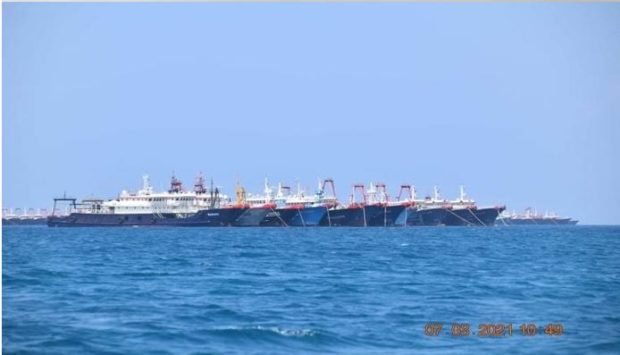Maritime security expert urges cooperation, not confrontation in sea row

Around 220 Chinese militia vessels were spotted moored at Julian Felipe Reef in the West Philippine Sea last March 7, 2021. (NTF WPS)
MANILA, Philippines — The Philippines should not beg China to “play ball” on issues concerning the West Philippine Sea (WPS), according to a maritime security expert.
“There’s a better way to do this, and it starts with the Philippines approaching its fellow claimants in the Southeast Asia bilaterally and multilaterally, not begging China on bended knees to pretty please play ball this time, because Beijing is not gonna play ball,” Gregory Poling, an American maritime expert, said during Monday’s online press briefing for the US Embassy Manila’s three-part webinar called “Oceans of Opportunity.”
Poling is the director of the Asia Maritime Transparency Initiative of the Center for Strategic and International Studies based in Washington.
“Beijing has been consistently unwilling to meet Asean (Association of the Southeast Asian Nations), or the Philippines, halfway on these issues,” he said.
Pursue joint developments
“Yes, [let’s] pursue joint developments, but let’s stop trying to go back and redo things that have failed consistently for the past 25 years,” he added.
Article continues after this advertisementIn general, Poling said, cooperation on maritime protection and preservation would be a more tactful and diplomatic way of dealing with territorial disputes in the WPS or the whole of South China Sea.
Article continues after this advertisement“Cooperation is obviously better than confrontation. It’s certainly important for all the claimants included to pursue those bilateral and multilateral efforts, whether it’s through joint fisheries management, coastguard cooperation,” he said.
According to Poling, the Philippines has been trying to promote cooperation primarily through the Code of Conduct process as well as the 2002 DOC (Asean-China Declaration on the Conduct of Parties in the South China Sea), which, he said, had a whole chapter on cooperation and mechanisms that all of the claimants, including China, were supposed to pursue.
Bad experience with China Jay Batongbacal, director of the University of the Philippines Institute for Maritime Affairs and Law of the Sea, said that while it was ideal for parties to pursue cooperation, he said it should be a cooperation that “creates trust and confidence, cooperation based on mutual respect and equality and not cooperation for the purpose of taking advantage of a weaker party.”
“But with respect to this issue, we pointed out about China, unfortunately, our experience with China has not been very good,” he said.
Three international law experts, including former Supreme Court Associate Justice Francis Jardeleza, asked President Rpdrogp Duterte to certify as urgent the enactment of a new Philippine Baselines Law.
Jardeleza maintained on Monday that a new law to amend Republic Act No. 9522, or the Philippine Baselines Law of 2009, would be “the most inexpensive and yet most effective means of enforcing the Arbitral Award and strengthening our territorial and maritime rights in the West Philippine Sea.”
The proposed law identifies at least 100 maritime features, including 35 said to be rocks or high tide features that generate a territorial sea and a contiguous zone, in the West Philippine Sea.
Jardeleza said the proposed changes to the law “ensures that the Philippines is the first claimant over the Spratly chain of islands to legislate the individual names and baselines of the claimed features.”